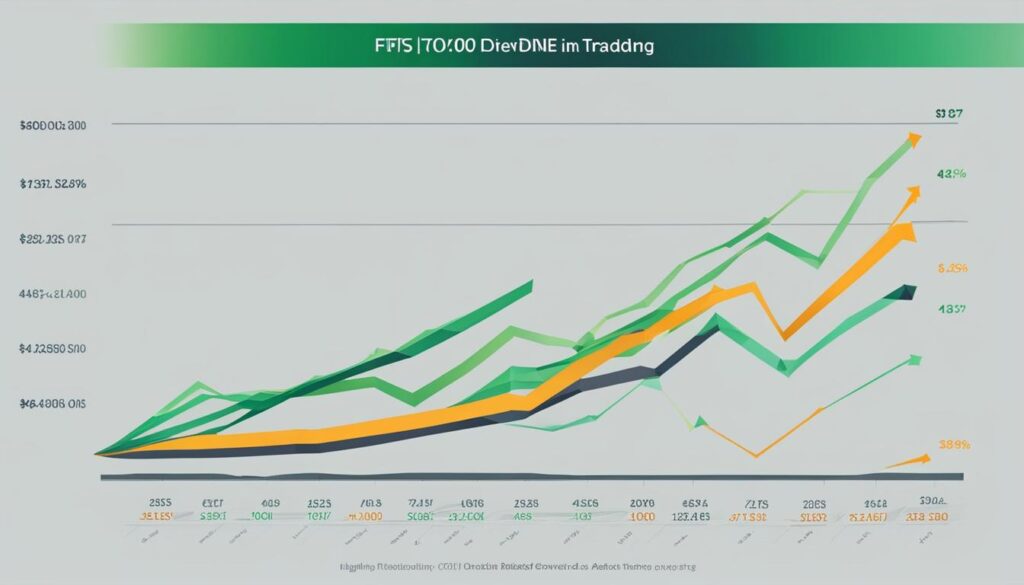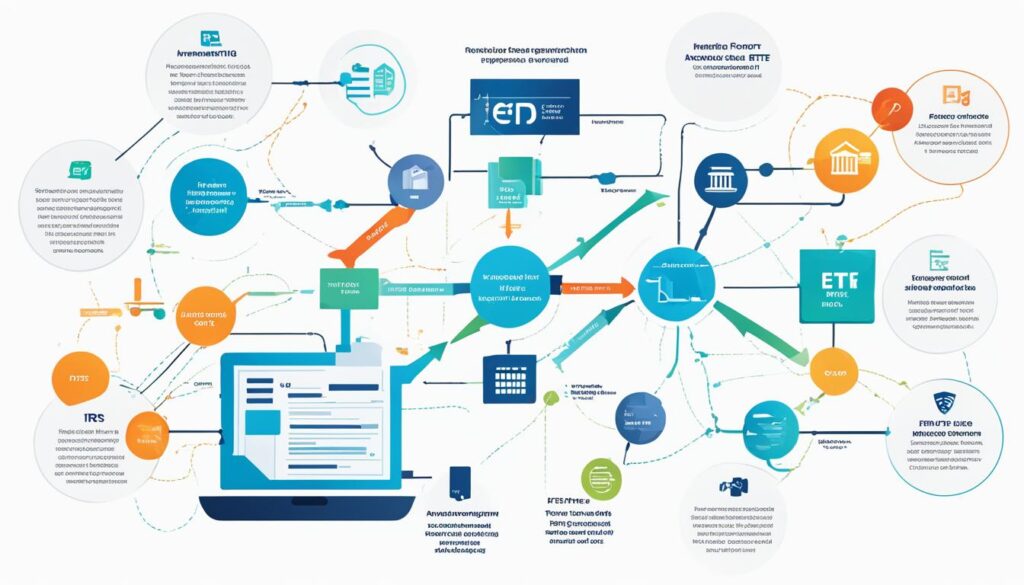As an investor, it’s crucial to be aware of the tax implications associated with ETF (exchange-traded fund) trading. ETFs have become a popular investment choice due to their flexibility and diversification benefits. However, failing to understand the tax considerations can result in unexpected tax liabilities or missed opportunities for tax optimization. In this article, I will explore the key tax implications that you should be mindful of when engaging in ETF trading.
Key Takeaways
- ETF trading involves various tax considerations that can impact your overall investment returns.
- Understanding capital gains and losses in ETF trading is crucial for tax planning.
- Dividends received from ETFs can be classified as qualified or non-qualified, affecting the tax rate.
- Adhering to IRS reporting requirements is essential to ensure compliance and avoid penalties.
- Consulting with a tax professional or financial advisor can help you navigate the complex tax landscape of ETF trading.
Capital Gains in ETF Trading
When engaging in ETF trading, it is important to understand the concept of capital gains. Capital gains refer to the profits or losses that result from selling or disposing of an ETF. The calculation of capital gains is based on two factors: the price at which the ETF was purchased (known as the cost basis) and the price at which it is sold.
If the selling price of the ETF is higher than the cost basis, the investor realizes a capital gain. Conversely, if the selling price is lower, a capital loss is incurred. This calculation is essential in determining the financial outcome of an ETF trade.
The tax treatment of capital gains in ETF trading is dependent on the type of account in which the ETF is held. If the ETF is held in a taxable account, the amount of capital gains made from the sale of the ETF is subject to taxation. On the other hand, if the ETF is held in a tax-advantaged account, such as an IRA or a 401(k), the taxes on capital gains may be deferred.
It is important for investors to consider the potential tax implications of capital gains in ETF trading to make informed decisions and effectively manage their tax obligations. Seeking advice from a tax professional or financial advisor can provide valuable insights into optimizing tax efficiency in ETF trading strategies.
Example of capital gains in ETF trading:
| Purchase Price | Selling Price | Capital Gain/Loss |
|---|---|---|
| $50 | $70 | $20 (Capital Gain) |
| $100 | $80 | -$20 (Capital Loss) |
Dividends in ETF Trading
In ETF trading, dividends play an important role in determining the overall returns for investors. Dividends are essentially a portion of a company’s profits that are distributed to shareholders. Similarly, ETFs can distribute dividends to their shareholders based on the income generated by the underlying securities held in the fund.
When it comes to taxes, dividends in ETF trading can be categorized as qualified or non-qualified. Qualified dividends are typically subject to a lower tax rate, similar to long-term capital gains. On the other hand, non-qualified dividends are taxed at your ordinary income tax rate.
The tax treatment of dividends in ETF trading may also vary depending on the type of account in which the ETF is held. If you hold your ETFs in a taxable account, the dividends you receive will be subject to taxation. However, if you hold your ETFs in a tax-advantaged account such as an IRA or 401(k), you may be able to defer taxes on dividends until you withdraw funds from the account.
Understanding the tax implications of dividends in ETF trading is crucial for investors to make informed decisions and optimize their after-tax returns. By considering the tax rates and the type of account in which the ETF is held, investors can strategically plan their investments to align with their financial goals and tax obligations.
Key Takeaways:
- ETFs can distribute dividends to shareholders based on the income generated by the underlying securities held in the fund.
- Dividends in ETF trading can be classified as qualified or non-qualified.
- Qualified dividends are subject to a lower tax rate, while non-qualified dividends are taxed at your ordinary income tax rate.
- The tax treatment of dividends in ETF trading can vary depending on the type of account in which the ETF is held.
IRS Reporting Requirements for ETF Trading
As an ETF trader, it is important to understand the IRS reporting requirements to ensure compliance with tax laws. Reporting your ETF transactions accurately and timely is crucial to avoid penalties or non-compliance. Here, I will outline the specific IRS reporting requirements for ETF trading.
Sale of ETF Shares
When you sell or dispose of ETF shares, it is necessary to report these transactions to the IRS. The IRS requires you to report the sales price and the cost basis of the shares. The cost basis is typically the original purchase price, but it can also include other adjustments such as reinvested dividends or capital gains distributions.
Capital Gains and Losses
In addition to reporting the sale of ETF shares, you must also report any capital gains or losses incurred. If you sell your ETF shares at a higher price than the cost basis, you have a capital gain. Conversely, if you sell at a lower price, you have a capital loss. These gains or losses need to be reported to the IRS when filing your tax return.
Dividends Received
If your ETFs distribute dividends, you are required to report these dividend payments to the IRS. The amount of dividends received should be reported on your tax return for the relevant tax year. The tax treatment of dividends in ETF trading depends on whether they are qualified or non-qualified dividends, as explained in Section 3.
IRS Forms and Reporting Requirements
The specific IRS forms and reporting requirements for ETF trading depend on the type of account in which you hold your ETFs. For taxable accounts, you will likely need to report your ETF transactions on Schedule D of Form 1040. This includes reporting the sales, capital gains, and dividends received. Additionally, if you received more than $10 in dividends, you will need to report them on Form 1099-DIV.
It is important to consult with a tax professional or financial advisor for guidance on the IRS reporting requirements specific to your situation. They can provide personalized advice and help you navigate the complexities of reporting ETF transactions to the IRS.
By understanding and fulfilling the IRS reporting requirements for ETF trading, you can ensure compliance with tax laws and minimize the risk of penalties or non-compliance. Stay informed and keep accurate records of your ETF transactions to make tax season a smooth process.
Conclusion
Understanding the tax implications of ETF trading is vital in order to maximize your after-tax returns and avoid potential penalties or non-compliance with tax laws. By being mindful of the tax considerations associated with capital gains, dividends, and IRS reporting requirements, you can make informed decisions and effectively manage your tax obligations in ETF trading.
It is recommended to consult with a tax professional or financial advisor to gain a comprehensive understanding of the individual tax implications based on your unique circumstances. They can provide personalized guidance and help you navigate the complex tax landscape.
Investing wisely and maintaining a tax-efficient approach in your ETF trading journey will not only help you optimize your investment returns, but also ensure compliance with tax regulations. Stay informed, stay proactive, and make the most of your ETF trading strategies.
FAQ
What are the tax implications of ETF trading?
The tax implications of ETF trading include capital gains or losses, tax treatment of dividends, and IRS reporting requirements.
How are capital gains taxed in ETF trading?
The tax treatment of capital gains in ETF trading depends on whether the ETF is held in a taxable account or a tax-advantaged account, such as an IRA or 401(k).
How are dividends taxed in ETF trading?
Dividends in ETF trading can be classified as qualified or non-qualified, with different tax rates applied. The tax treatment of dividends also varies depending on the type of account in which the ETF is held.
What are the IRS reporting requirements for ETF trading?
As an ETF trader, you are required to report your transactions to the IRS, including selling ETF shares, capital gains or losses incurred, and dividends received. The specific forms and reporting requirements depend on the type of account in which the ETFs are held.
How can I effectively manage tax obligations in ETF trading?
To effectively manage tax obligations in ETF trading, it is crucial to understand the tax considerations related to capital gains, dividends, and IRS reporting requirements. Consult with a tax professional or financial advisor to fully understand the individual tax implications based on your specific circumstances.
Source Links
- https://finance.yahoo.com/news/7-secret-strategies-quick-cash-170008344.html
- https://www.bnnbloomberg.ca/milei-vows-to-shutter-argentina-s-central-bank-sooner-or-later-1.2020854
- https://www.wsj.com/livecoverage/stock-market-today-cpi-report-inflation-01-11-2024
Disclaimer
All information on this website is of a general nature. The information is not adapted to conditions that are specific to your person or entity. The information provided can not be considered as personal, professional or legal advice or investment advice to the user.
This website and all information is intended for educational purposes only and does not give financial advice. Signal Mastermind Signals is not a service to provide legal and financial advice; any information provided here is only the personal opinion of the author (not advice or financial advice in any sense, and in the sense of any act, ordinance or law of any country) and must not be used for financial activities. Signal Mastermind Signals does not offer, operate or provide financial, brokerage, commercial or investment services and is not a financial advisor. Rather, Signal Mastermind Signals is an educational site and a platform for exchanging Forex information. Whenever information is disclosed, whether express or implied, about profit or revenue, it is not a guarantee. No method or trading system ensures that it will generate a profit, so always remember that trade can lead to a loss. Trading responsibility, whether resulting in profits or losses, is yours and you must agree not to hold Signal Mastermind Signals or other information providers that are responsible in any way whatsoever. The use of the system means that the user accepts Disclaimer and Terms of Use.
Signal Mastermind Signals is not represented as a registered investment consultant or brokerage dealer nor offers to buy or sell any of the financial instruments mentioned in the service offered.
While Signal Mastermind Signals believes that the content provided is accurate, there are no explicit or implied warranties of accuracy. The information provided is believed to be reliable; Signal Mastermind Signals does not guarantee the accuracy or completeness of the information provided. Third parties refer to Signal Mastermind Signals to provide technology and information if a third party fails, and then there is a risk that the information may be delayed or not delivered at all.
All information and comments contained on this website, including but not limited to, opinions, analyzes, news, prices, research, and general, do not constitute investment advice or an invitation to buy or sell any type of instrument. Signal Mastermind Signals assumes no responsibility for any loss or damage that may result, directly or indirectly, from the use or dependence on such information.
All information contained on this web site is a personal opinion or belief of the author. None of these data is a recommendation or financial advice in any sense, also within the meaning of any commercial act or law. Writers, publishers and affiliates of Signal Mastermind Signals are not responsible for your trading in any way.
The information and opinions contained in the site are provided for information only and for educational reasons, should never be considered as direct or indirect advice to open a trading account and / or invest money in Forex trading with any Forex company . Signal Mastermind Signals assumes no responsibility for any decisions taken by the user to create a merchant account with any of the brokers listed on this website. Anyone who decides to set up a trading account or use the services, free of charge or paid, to any of the Broker companies mentioned on this website, bears full responsibility for their actions.
Any institution that offers a service and is listed on this website, including forex brokers, financial companies and other institutions, is present only for informational purposes. All ratings, ratings, banners, reviews, or other information found for any of the above-mentioned institutions are provided in a strictly objective manner and according to the best possible reflection of the materials on the official website of the company.
Forex/CFD trading is potentially high risk and may not be suitable for all investors. The high level of leverage can work both for and against traders. Before each Forex/CFD investment, you should carefully consider your goals, past experience and risk level. The opinions and data contained on this site should not be considered as suggestions or advice for the sale or purchase of currency or other instruments. Past results do not show or guarantee future results.
Neither Signal Mastermind Signals nor its affiliates ensure the accuracy of the content provided on this Site. You explicitly agree that viewing, visiting or using this website is at your own risk.




